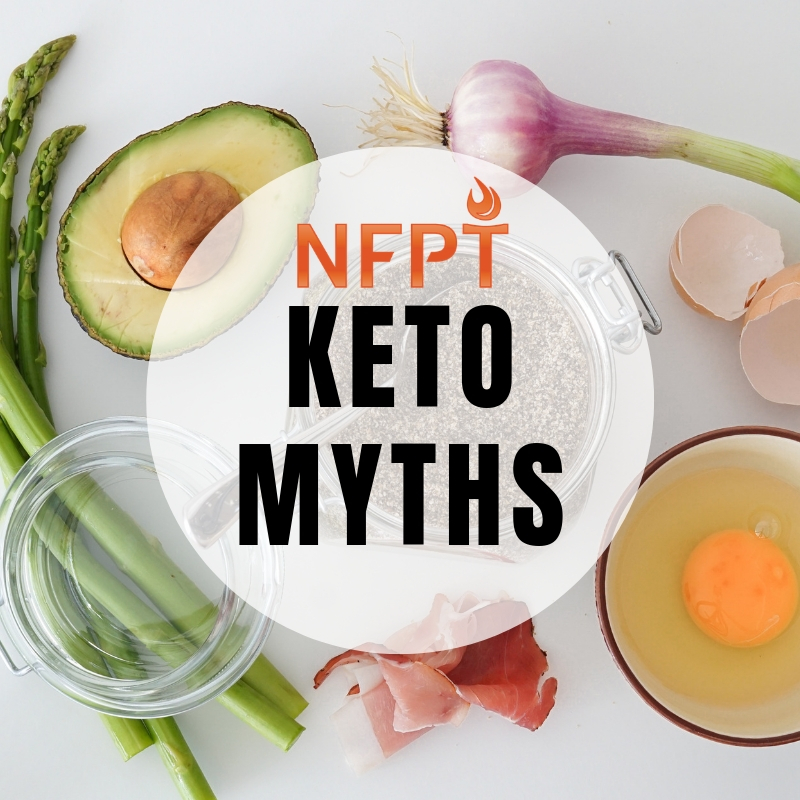
The ketogenic diet is popular and effective even though a lot of controversy (and confusion) surrounds it. Before taking a firm stance or forming an opinion about it, take time to learn about it from credible resources.
As fitness professionals, we do not prescribe, treat, or create meal plans when talking to clients about anything nutrition related, as guided by our scope of practice. Yet, it is important to understand what the keto diet is and what it isn’t.
Here are some common misconceptions about ketogenic diets:
1) Ketogenic diets are a fad.
The original ketogenic diet was founded in 1923 by Dr. Russell Wilder for the treatment of epilepsy (Charlie Foundation, n.d.; Freeman, Kossoff, & Hartman, 2007; Roehl, & Sewak, 2017). Of late, it’s become a trend and being used as a rapid weight loss method. This wasn’t always the case. It takes the body time to adapt to a ketogenic state.
In his article on how ketogenic diets went mainstream, Michael Easter (Men’s Health) discusses how people endeavor to find a quick fix to losing weight, propelling the ketogenic diet into popularity. He also provides examples of how effective the ketogenic diet has been long before this trend happened. Check out this resource at the bottom of the blog to learn more.
2) Ketogenic diets are medically unsafe.
There is documented evidence that the ketogenic diet is beneficial to metabolic syndrome (Cox, 2016; Dashti et al., 2004). Metabolic syndrome is characterized by the following risk factors (American Heart Association, 2015):
- High blood glucose (sugar)
- Low levels of HDL (“good”) cholesterol in the blood
- High levels of triglycerides in the blood
- Large waist circumference or “apple-shaped” body
- High blood pressure
Metabolic syndrome often shows up in individuals deemed “morbidly obese” “obese” or “clinically obese” or as a precursor thereof (American Heart Association, 2015). In these cases, ketogenic states can be beneficial (Cox, 2016; Dashti et al., 2004). There’s also evidence that a ketogenic diet can benefit neuroinflammation and psychological states such as depression (Ede, 2017).
3) Ketogenic diets are a bad idea for athletes.
While some professionals would say that athletes can’t benefit from the ketogenic diet because of the human body’s need to be fueled by carbohydrates, studies have shown that being in a ketogenic state assists in sports performance, weight loss and systemic inflammation. (Cox et.al, 2016; Dashti, et al., 2004).
If a client comes to work with you and is on a ketogenic diet for a medical reason, you can support and train them to reach their goals. In a ketogenic state, the body is converting fat into ketones, which are then used as the primary source of fuel.
For more information and details check out Episode 26 of NFPT Live – What is the Ketogenic Diet?.
4) The high-fat content of a ketogenic diet will create a higher risk for cardiovascular disease and atherosclerosis.
The human body goes through a metabolic switch once it’s in a ketogenic state. Fat is converted to ketones, rather than stored, and the ketones are what are used to fuel the body. The fat consumed on a true ketogenic diet is being utilized and therefore, if done appropriately, should not increase risks for cardiovascular disease and atherosclerosis (Cox, 2016; Dashti et al., 2004).
5) There is only one kind of ketogenic diet and therefore only one way to do the ketogenic diet.
There are several types of ketogenic diets:
- Standard Ketogenic Diet (SKD)
- Targeted Ketogenic Diet (TKD)
- Cyclical Ketogenic Diet (CKD)
These variations can be used by an experienced and qualified professional to induce ketosis and accommodate physiological, athletic, and lifestyle goals because one size doesn’t fit all!
Standard Ketogenic Diet is the major type of ketogenic diet that’s been prevalent on social media. Typically, 75-80% of the SKD diet comes from fats, 20-25% from protein, and 5-10%% from Carbohydrates. Typically, it amounts to eating about 20-30 grams net CHO per day.
Targeted Ketogenic Diet can benefit athletes because the number of net carbs ingested can be increased based on activity level. It can be “targeted” to support a client’s exercise.
Cyclical Ketogenic Diet is like SKD. The major difference is there’s some cycling of Carb intake going on. Individuals on CKD would have a period of low carbohydrate intake followed by a period of eating a higher number of carbs. The cycle can be repeated based on the individual’s needs (Hughes, 2016 & Land, 2016).
6) The ketogenic diet is highly restrictive when it comes to food choices, so adherence is difficult.
Here’s a list of ketogenic friendly foods (Charlie Foundation, n.d.; Hughes, 2016; & Land, 2016):
Meats: Fatty cuts of grass-fed beef, chicken and other poultry, pork, lamb, goat, turkey, veal, and fish sources like salmon, sardines, catfish, tuna, trout, etc.
Oils: Olive oil, avocado oil, coconut oil, ghee, grass-fed butter, and nuts and seeds (whole or as butter).
Whole Eggs: Preferably organic, free-range. Yolks preferred as they contain all of the fat content.
Dairy: Full-fat cheeses, sour cream, full-fat (unsweetened) yogurt, and heavy creams.
Low-carb vegetables and fruits: Spinach, kale, broccoli, cauliflower, asparagus, and other leafy greens. Small quantities of blueberries, strawberries, raspberries, and avocados.
The ketogenic diet was initially used to treat epileptic seizures over 100 years ago. Recent research suggests that eating a ketogenic diet may benefit the following disease states (Charlie Foundation, n.d.; Cox, 2016; Dashti, 2004; Ede, 2017).
• Epilepsy
• Brain Tumor/Cancer
• Alzheimer’s Disease
• Parkinson’s Disease
• Traumatic Brain Injury
• Mitochondrial Disease
• Autism
• ALS
• Brain Health
• Diabetes: Type-I and Type II
Recently, it’s seen a surge to be used for weight loss and is consequently coming under scrutiny due to some major misconceptions and misuses. Keep learning more about this diet and how it might support your clients in reaching goals.
__________________________________________
_____________________________
Article References
- American Heart Association 2015 Answers by Heart Cardiovascular Conditions Retrieved December 1st, 2017 from http://www.heart.org/idc/groups/heart-public/@wcm/@hcm/documents/downloadable/ucm_300322.pdf
- Charlie Foundation for Ketogenic Therapies (n.d.). What is ketosis? (n.d.) . Retrieved from : https://charliefoundation.org/diet-plans/
- Cox, et al. (2016). Clinical and Translational Report: Nutritional Ketosis Alters Fuel Preference and Thereby Endurance Performance in Athletes. In Cell Metabolism, 24(2), 256-268.
- Dashti, H.M., Mathew, T.C., et al. (2004). Long-term effects of a ketogenic diet in obese patients. Clinical Cardiology, 9(3), 200-2005.
- Ede, G. (2017). Low carbohydrate diet superior to antipsychotic medications. Psychology Today. Retvive from https://www.psychologytoday.com/us/blog/diagnosis-diet/201709/low-carbohydrate-diet-superior-antipsychotic-medications
- Easter, M. (2019, Jan 10). Inside the rise of keto: How an extreme diet went mainstream. Retrieved from: https://www.menshealth.com/nutrition/a25775330/keto-diet-history/
- Freeman JM, Kossoff EH, Hartman AL (Mar 2007). “The ketogenic diet: one decade later”. Pediatrics. 119 (3): 535–43.
- Hosford, B. (2018, Jan 4). NFPT Live: What is the Ketogenic Diet? – Ep 26. Retrieved from: https://nfpt.com/blog/ketogenic-diet-nfpt-live
- Hughes, K. (2016). Ketogenic Diet: 250+ Low-Carb, High-Fat Healthy Keto Recipes & Desserts + 100 Keto Tips, Tools, Resources & Mistakes to Avoid. New Brunswick, New Jersey: CreateSpace Independent Publishing Platform.
- Land, S. (2016). Keto bodybulilding: The definitive guide to doing resistance training on a low carb ketogenic diet. Retrieved from audible.com.
- Nitschke, E. (2018, Jan 3). What is a Ketogenic Diet? NFPT Blog. Retrieved from:https://nfpt.com/blog/what-is-a-ketogenic-diet
- Roehl, K. & Sewak, S.L. (2017). Practice Paper of the Academy of Nutrition and Dietetics: Classic and Modified Ketogenic Diets for Treatment of Epilepsy. Journal of the Academy of Nutrition & Dietetics, 117(8), 1279-1292.




